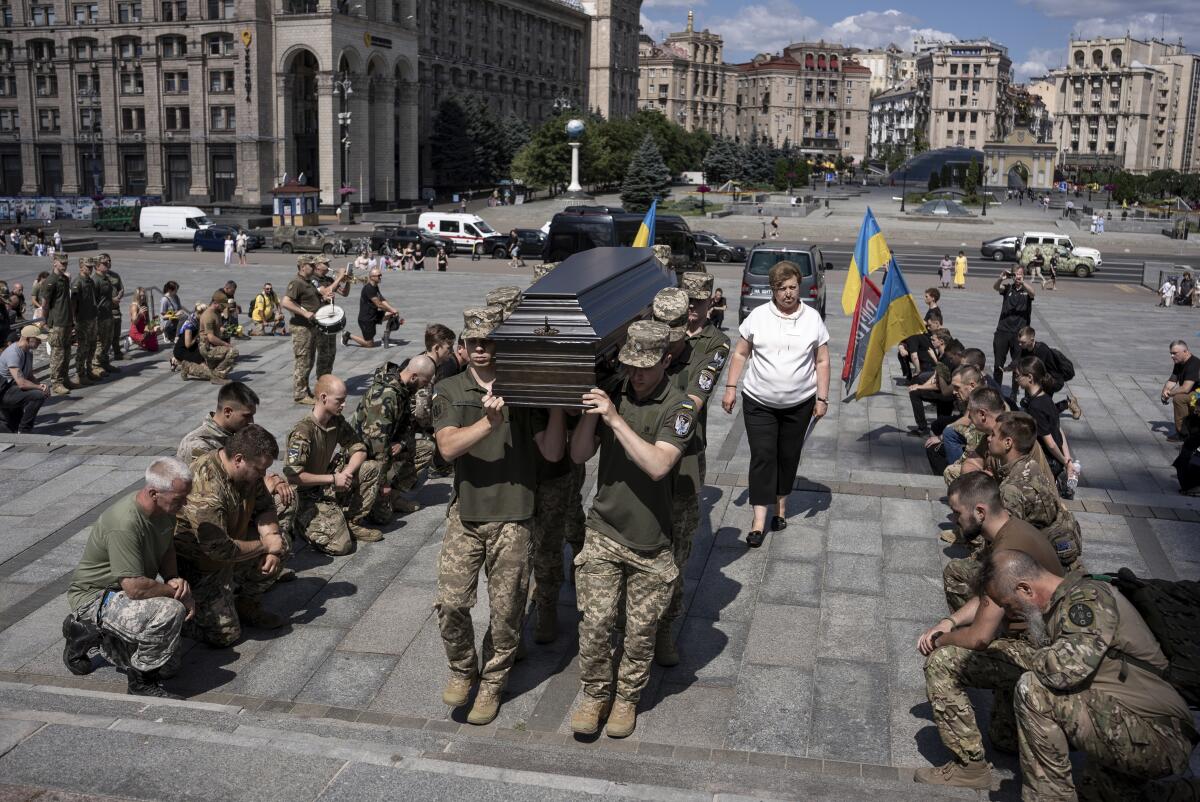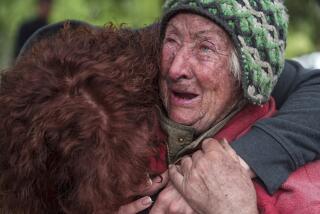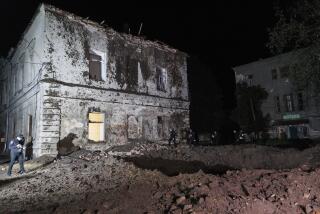Russian strikes on Ukraine cut power and water to thousands; civilian deaths rise

KYIV, Ukraine — Russian strikes left more than 100,000 households without power in northern Ukraine and cut off the water supply to a regional capital, Ukrainian authorities reported Saturday, while civilian casualties rose sharply in the country’s embattled east.
The northern Sumy region, which borders Russia, was plunged into darkness after Russian strikes late Friday damaged energy infrastructure, the Ukrainian Energy Ministry said. Hours later, the Ukrainian public broadcaster reported that Russian drones hit the provincial capital, also called Sumy, cutting off water by hitting power lines that feed its system of pumps.
Russian state agency RIA cited a local pro-Kremlin “underground” leader as saying that Moscow’s forces overnight hit a plant producing rocket ammunition in the city, which had a pre-war population of more than 256,000. The report didn’t specify what weapon was used, and the claim could not be independently verified. Explosions rocked the city during an air raid warning early Saturday, according to Ukrainian media reports.
Russia is continually targeting Ukraine’s energy infrastructure, resulting in hours of rolling blackouts across the country. Ukrainian officials have warned that the situation may worsen as winter approaches.
Ukrainians displaced by war find new purpose in Shakespeare’s play of love, loss and madness, bringing their blood-red version to the bard’s hometown.
In the Donetsk region in the east, Russian shelling on Friday and overnight killed 11 civilians and wounded 43, local Gov. Vadym Filashkin reported Saturday. Five people died in the town of Selydove southeast of Pokrovsk, the eastern city that has emerged as a front-line hot spot.
The Ukrainian General Staff on Saturday said that Ukrainian and Russian forces clashed 45 times near Pokrovsk over the previous day. Hours later, the Russian Ministry of Defense announced its troops had captured a village some 20 miles east of the city.
According to Filashkin, three more civilians died in Chasiv Yar, the strategically located town in Donetsk that has been reduced to rubble under a monthlong Russian assault.
Russian forces have for months tried to grind out gains in Ukraine’s industrial east, in an apparent attempt to lock its defenders into a war of attrition, after Kyiv’s forces thwarted a cross-border push farther north that briefly threatened Ukraine’s second-largest city of Kharkiv.
Kharkiv, Ukraine’s second-largest city, is facing intense Russian airstrikes, but its residents are defiant. “We can stand up, no matter what they do,” one said.
A Ukrainian military spokesperson on Thursday told the AP that Ukrainian forces had retreated from a neighborhood on the outskirts of Chasiv Yar. Military analysts say its fall would put nearby cities in jeopardy. It could also compromise critical Ukrainian supply routes and bring Russia closer to its stated aim of seizing the entire Donetsk region.
According to the Ukrainian General Staff, Russian forces on Friday and overnight launched six rocket strikes and 55 airstrikes across Ukraine, and used more than 70 “glide bombs” — retrofitted Soviet-era weapons that have wrought devastation in the country in recent weeks.
In Kyiv, Ukrainian service members gathered Saturday to pay last respects to a British combat medic who set up a charity delivering essential supplies to front-line fighters.
Peter Fouché died at the front line last Thursday as his unit clashed with Russian troops, according to a statement by Project Konstantin, a volunteer group that since 2022 has ferried drones, vehicles, uniforms and food to Ukrainian soldiers in the east. According to its website, it has also helped evacuate 219 Ukrainian soldiers from combat zones.
France braces for potential political earthquake: a far-right surge. What to know about the election
French election: The far right seems poised to win biggest share of parliamentary seats; President Emmanuel Macron looks to have made a terrible political bet.
At the farewell ceremony, Ukrainian soldiers carried Fouché’s coffin through Kyiv’s landmark Independence Square, the site of mass protests in 2014 that forced out a pro-Russia president, toward a memorial for the country’s fallen defenders. Fouché’s comrades held back tears as they lined up to say goodbye. Mourners read prayers as they held up Ukrainian flags and military banners.
Fouché’s partner, wearing a traditional Ukrainian embroidered shirt, knelt to embrace the coffin. Halyna Zhuk, who co-founded Project Konstantin and has a daughter with the medic, called him a “true hero.”
Fouché, a native of west London who turned 49 this year, helped build a field hospital in Kyiv before he started Project Konstantin, according to the group’s website, and later enlisted in the Ukrainian army. At least five other Britons have been killed while volunteering in Ukraine since Russia’s full-scale invasion in February 2022.
In Russia, two civilians were wounded after Ukrainian forces overnight shelled a border town in the southern Belgorod region, its Gov. Vyacheslav Gladkov reported.
On Friday, Hungarian Prime Minister Viktor Orbán visited Moscow for a rare meeting by a European leader with Russian President Vladimir Putin and discussed peace proposals for Ukraine.
The visit, which triggered condemnation from Kyiv, came days after Orbán made a similar unannounced trip to Ukraine, where he met with President Volodymyr Zelensky and proposed that he consider agreeing to an immediate cease-fire with Russia.
Hungary assumed the rotating presidency of the European Union at the start of July and Putin suggested that Orbán had come to Moscow as a top representative of the European Council. Several top European officials dismissed that suggestion and said Orbán had no mandate for anything beyond a discussion about bilateral relations.
More to Read
Sign up for Essential California
The most important California stories and recommendations in your inbox every morning.
You may occasionally receive promotional content from the Los Angeles Times.













